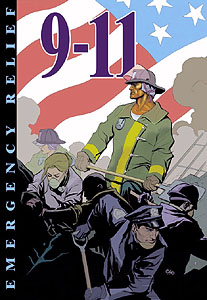![[Metroactive News&Issues]](/gifs/news468.gif)
[ San Jose | Metroactive Central | Archives ]
Comic book artists unite for serious business
By Traci Vogel
EVER SINCE Art Spiegelman's epic allegorical treatment of the Holocaust, Maus, won the Pulitzer Prize in 1992, comic books have tried, with increasing sophistication, to break the funnybone implicit in the genre's name. These days, cartoonists tackle issues like genocide (Joe Sacco's Safe Area Gorazde), child abuse (Phoebe Gloeckner's A Child's Life), and the plain gray angst of existence (Ben Katchor's Julius Knipl, Real Estate Photographer) in their seemingly modest pages. They reimagine life in wartime (Jason Lutes' Berlin), and in high school (Daniel Clowes' Ghost World) in equally cathartic detail. Comics, in short, have become, for many, the modern theater of confrontation.
Which is exactly the reasoning behind 9-11: Emergency Relief, a collection of first-person, nonfiction accounts of the harrowing World Trade Center terrorist attack, to be published by Alternative Comics in January 2002. The collection brings together established artists with new ones; most notably, it will include work from Will Eisner, who is often credited as the "inventor" of the graphic novel. The cartoonists themselves, many of whom live in New York, hatched the idea late last week, according to Alternative Comics publisher Jeff Mason.
Mason says the cartoonists "wanted to create a collection of thoughtful, introspective stories," partly to work out their own emotional reactions, and partly to offer an outlet to others. Proceeds from the project will go to benefit the American Red Cross.
Jessica Abel, creator of the popular comic book series Artbabe and the soon-to-be-published La Perdida, moved to New York a little over a year ago. Abel, who is no stranger to the world of comics journalism--her "press photographer"-style stories have appeared in the LA Weekly and The Baffler--says the process of understanding what's happened will take a while. Speaking from Brooklyn, where she and her husband (and fellow cartoonist) Matt Madden live, Abel says, "Art of any kind can help us [understand trauma], but only once we artists have a chance to process the event and come up with our take on it. At the moment, shell shock seems to be the prevalent mode."
Abel finds comfort in the comics community, and helped to organized a miniconvention in Brooklyn on Sunday, Sept. 16, which she dubbed "SP-XILES," in honor of the cancelled "SPX" comics convention originally scheduled to take place in Boston (proceeds from SP-XILES will also be donated to the recovery effort). "Mostly," Abel says, "what can help us heal, aside from using our creativity to find an outlet, is community--coming together around friendship and common interests so we don't feel so alone."
Dean Haspiel's pen-and-ink work has been exploring the hazards and rewards of living in New York with increasing intensity, over the years. His last collection, Opposable Thumbs, is drawn in a cramped style that works as a metaphor for city living. But this tragedy, says Haspiel, proves that "New Yorkers walk the dog--no matter the consequences. I am hardly surprised," Haspeil goes on, "by the combined efforts and heroism that my brothers and sisters achieved, doing what they had to do to save our community and rise from the ashes, scathed but strong."
The process of filtering emotion through art is not supposed to simplify things. When we are so numbed to seeing tragedy mediated through the television and the movieplex, seeing it redrawn though the pen of a comic artist can reveal the less passive, less simplistic expanse of the human experience. 9-11: Emergency Relief''s cover, for example, drawn by Frank Cho, shows rescue workers shoulder-to-shoulder amid the rubble, the stars and stripes streaming outsized behind them. The workers have the square jaws and noble aspects of traditional comic book superheroes, but they're not superheroes. They're simply human beings, set to a terrible task.
Asked in a 1992 interview whether there were lessons to be learned from the Holocaust, Art Spiegelman said bluntly, "I have no idea." Comics, he asserted, are not moral storyboards. "I would find it a cheap shot to try to give any moral to it. It would be kind of diminishing what happened. My stories are a matter of presenting rather than projecting. Obviously it would be nice if people were nicer to each other. This is a moral?"
For more information, and to preorder the book, see www.indyworld.com/relief.
[ San Jose | Metroactive Central | Archives ]
Copyright © 2001 Metro Publishing Inc. Metroactive is affiliated with the Boulevards Network.
For more information about the San Jose/Silicon Valley area, visit sanjose.com.
![]()
 Not Funny
Not Funny
From the September 20-26, 2001 issue of Metro, Silicon Valley's Weekly Newspaper.